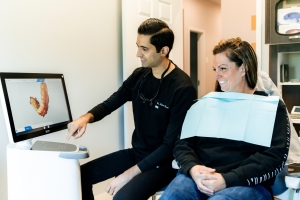Key Takeaways
- The dental implant procedure involves three main phases: comprehensive consultation with 3D imaging, surgical placement of the titanium implant, and final restoration attachment after osseointegration
- Osseointegration takes three to six months, during which the implant fuses with your jawbone to create a stable foundation that mimics natural teeth
- Some patients may need supplemental procedures like bone grafting or sinus lifts before implant placement if bone health is insufficient
- Same-day implant options and advanced digital planning are now available at our Hilliard dental office for qualifying patients
- Post-surgery care includes following a soft food diet, avoiding smoking, managing discomfort with prescribed medications, and maintaining excellent oral hygiene
Safe and Advanced Dental Implant Surgery Near You in Hilliard
Looking for a dental implant dentist near you who provides cutting-edge, comfortable care? Our experienced dentist in Hilliard offers state-of-the-art dental implant procedures using the latest technology, including digital planning and minimally invasive techniques.
Dental implants have become one of the most sought-after solutions for tooth replacement, with advancements in technology driving their success rates even higher. The increasing demand for this durable and natural-looking option is making it the gold standard for replacing missing teeth.
Our Hilliard dental office proudly serves patients from Columbus, Dublin, Upper Arlington, Grove City, Westerville, and surrounding Central Ohio communities. Contact us today at (614) 771-6060 to schedule your consultation with our implant dentist near you.

How Modern Dental Implant Procedures Work at Fishinger Dental
Initial Consultation and Digital Evaluation
Your journey to restore your beautiful smile begins with a comprehensive consultation at Fishinger Dental in Hilliard. During this visit, our experienced dentist near you will:
- Assess your oral health and complete medical history to ensure you’re a good candidate
- Take advanced 3D scans using cone beam CT technology to evaluate bone density, structure, and jawbone health
- Discuss your personalized treatment plan goals and determine if dental implants are the right solution for your missing teeth
- Answer all your concerns about the process, timeline, and what to expect
Personalized Treatment Planning with Digital Precision
Once you’re deemed a candidate for dental implants in Hilliard, Dr. Nathan Desai creates a customized treatment plan using advanced digital technology. This comprehensive plan outlines:
- The number of implants needed to replace your missing teeth effectively
- Any preparatory procedures required (bone grafting, tooth extractions, or sinus lifts)
- Digital surgical guide creation for precise implant placement
- Complete timeline and cost breakdown for your implant dentistry treatment
- Options for implant-supported dentures or implant-supported bridges if replacing multiple teeth
Preparatory Procedures When Needed
Some patients require additional procedures before implant placement to ensure optimal success:
- Bone Grafting: If your jawbone lacks sufficient density or volume, bone grafting strengthens the foundation. This procedure supports healthy bone regeneration where the implant fuses with your jaw.
- Tooth Extractions: Damaged or decayed teeth must be removed before implant placement. We often perform immediate implant placement in the same appointment.
- Sinus Lifts: For upper jaw implants, a sinus lift may be necessary to create adequate space and bone height for stable implant placement.
Advanced Dental Implant Placement Surgery
The core of our dental implant procedure in Hilliard involves a surgical placement of the biocompatible titanium post. With the help of cone beam CT scans, dentists can now create highly accurate 3D images of a patient’s jawbone. This provides a detailed view of the structure for precise placement. Here’s what happens:
- Comfort and Anesthesia: Local anesthesia ensures you feel comfortable throughout the procedure. Sedation options are available for anxious patients.
- Minimally Invasive Technique: A small, precise incision accesses the jawbone with minimal tissue disruption.
- Digital-Guided Implant Insertion: The titanium implant is carefully placed using our digital surgical guide for optimal positioning.
- Immediate Restoration Options: In many cases, we can place a temporary crown the same day for immediate function and appearance.
- Professional Suturing: The surgical site is meticulously closed to promote optimal healing.
This outpatient procedure typically takes one to two hours per implant, and most patients return to normal activities within days.
Osseointegration: The Natural Healing Process
After placement, your dental implant undergoes osseointegration—the process where the implant fuses naturally with your jawbone. This critical phase:
- Takes three to six months, depending on your health, age, and bone quality
- Creates a stable foundation stronger than natural tooth roots
- Requires excellent oral hygiene and regular follow-up appointments to monitor healing
- Ensures the long-term success of your permanent tooth replacement solution
During this period, you’ll maintain your beautiful smile with a temporary restoration while your implant becomes part of your jawbone structure.
Abutment Placement and Final Restoration
Once osseointegration is complete, we attach the abutment—a small connector that will hold your final restoration. This minor procedure involves:
- Exposing the integrated implant through a small gum opening
- Securing the custom abutment designed specifically for your restoration
- Allowing one to two weeks for complete gum healing around the abutment
- Taking final impressions for your custom crown, bridge, or denture
Your Beautiful Final Restoration
The final step involves placing your custom-made restoration that perfectly matches your natural teeth. Our Hilliard dentist will:
- Craft a restoration using high-quality materials that mimic natural tooth appearance and function
- Ensure perfect fit and bite through precise adjustments
- Achieve optimal aesthetics so your restoration blends seamlessly with your existing teeth
- Provide care instructions to maintain your investment for a lifetime
Ready to replace missing teeth with the gold standard solution? Contact our dental office at (614) 771-6060 to schedule your implant consultation with our experienced dentist near you.

Post-Surgery Care for Optimal Healing
After your dental implant surgery near you, proper dental implant care ensures successful osseointegration and long-term implant health:
Essential Recovery Guidelines:
- Follow Your Dentist’s Instructions: Adhere to all post-operative care guidelines provided by our Hilliard dental office.
- Manage Discomfort Effectively: Use prescribed medications and apply cold compresses to minimize swelling during the first 48 hours.
- Maintain Excellent Oral Hygiene: Keep the surgical site clean while avoiding aggressive brushing directly over the implant area.
- Choose Soft Foods: Stick to a soft food diet for the first week, gradually introducing firmer foods as healing progresses.
- Avoid Harmful Habits: Eliminate smoking and alcohol consumption, which can interfere with healing and osseointegration.
- Attend All Follow-up Appointments: Regular check-ups allow us to monitor your healing progress and address any concerns promptly.
This is what most patients can expect during recovery after their implant surgery:
- Minimal discomfort managed effectively with over-the-counter pain relievers
- Return to normal activities within two to three days post-surgery
- Complete healing of soft tissues within seven to 14 days
- Full osseointegration is typically complete within three to six months
Frequently Asked Questions
Can dental implants fail?
While dental implant failure is rare (success rates exceed 95%), it can occur due to infection, poor osseointegration, or inadequate oral hygiene. Choosing an experienced implant dentist near you and maintaining excellent oral health significantly reduces this risk.
How do I know if I need bone grafting before dental implants?
Our dentist in Hilliard uses advanced 3D imaging to assess your jawbone density and volume. If your bone structure is insufficient to support implants, bone grafting can strengthen the foundation for successful implant placement.
How long does the entire dental implant process take in Hilliard?
The complete dental implant procedure typically takes four to six months from consultation to final restoration. The surgical placement takes just a few hours, but the implant needs 3-6 months to fuse with your jawbone through osseointegration before we can attach your permanent restoration.
Is the dental implant procedure painful?
Most patients report minimal discomfort during the dental implant procedure near you. We use local anesthesia to numb the area completely, and sedation options are available for anxious patients. Post-operative discomfort is typically managed easily with over-the-counter medications.
Schedule Your Dental Implant Consultation in Hilliard, OH
Ready to replace missing teeth with the most advanced tooth replacement solution available? Our dental implant dentist near you provides comprehensive implant services from single tooth replacement to full mouth restoration using implant-supported dentures and bridges.
Contact Fishinger Dental today at (614) 771-6060 to schedule your appointment with Hilliard’s trusted implant dentist! Our dental practice proudly serves patients in Hilliard, Columbus, Dublin, Upper Arlington, Grove City, Westerville, and all of Central Ohio.





